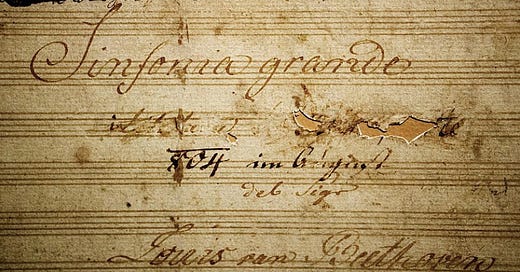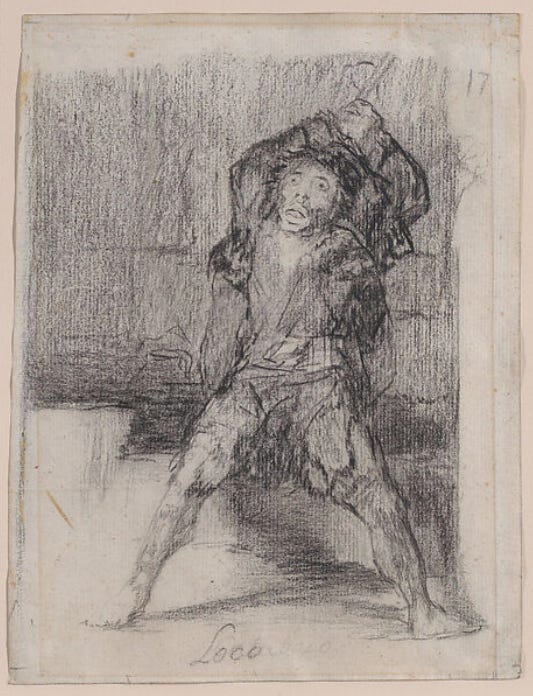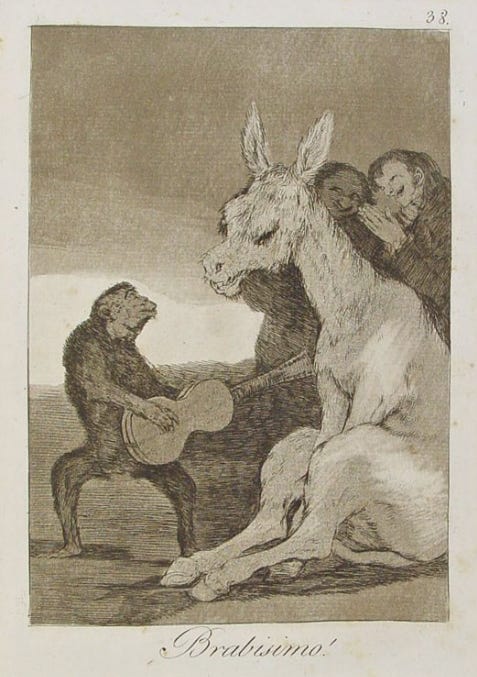"With shithead I was mistaken."—Ludwig van Beethoven
"Don't shout, idiot." — Francisco Goya


1.
He could hear Beethoven:
Black yew, white cloud,
The horrific complications.
Finger-traps—a tumult of keys. — Sylvia Plath1.
Beethoven’s neighbours called him “The Spaniard” because of his turbulent temperament, short stature and swarthy pigmentation. His grandmother, like Goya's, was Basque.
In 1798, he began to lose his hearing, five years after Goya lost his. Soon, he could not hear the upper registers of sound — a girl singing, the trilling blackbirds in the trees, a shepherd playing the pipe during a walk in the country, or his own Spanish guitar. Conducting became a bewildering farce, the baton waving madly, the musicians thrown from the beat into confusion and chaos. Soon, he could no longer hear the lower registers, except with a pencil in his mouth, with the other end pushed up against the soundboard to feel the note’s vibration between his front teeth. Soon, he could not hear whether his students were progressing or the music he was writing, the sound of the strings, or the different movements and rhythms of the motifs, except in his imagination.
Soon, he could hear nothing.
“Ah, how could I admit an infirmity in the one sense which ought to be more perfect in me than in others.”
2.
This is from one of Beethoven's Conversation Books, which hung around his neck: “Paper. Barber’s razor. Archduke’s receipt. Watch. Suspenders. Blotting paper. Shoe-horn for Karl. Chamber pot.”
This is from one of Goya’s: 1 barrel from Navarra, 1 local barrel (not soured or adulterated, please!), salt cod, and anchovies.
3.
Neither would survive in this world. They believed no pleasure should be forbidden, provided it caused no harm. They believed in an immaterial life force beyond language transcending every conception. They increasingly saw the world as a dark funnel. They emptied bottles of wine at breakfast. They roamed the streets, muttering and moaning off-key. They visited brothels and bought sex from streetwalkers. They had florid, froward, bellowing faces and wild hair that they packed inside hats — when they remembered to wear them. For this, they were stared at in astonishment. They said everything in such loud voices that those with them would cringe, and passersby would look at them with alarm as if they were monstrous brutes or deranged — which they were. They showed signs of paranoia. They entered into states of manic exaltation. They were prone to fits of sudden rage and violent shifts of mood.
4.
Like most artists of the period — or any period — they were enamoured of power. Which, then as now, was most often wealth, circulating in its tokenised form as money. The potential scarcity of which, and the worries this engendered, were their common currency.
They practised the art of pleasing. They were consummate toadies and fawners. They disdained the clergy but kissed the rings and grovelled for commissions. Their relationship with the ruling class was as reciprocally dependent as it was advantageous. The perceived value of their art enhanced their patrons' status and cultural influence, and their patrons' status and cultural influence enhanced the perceived value of their art.
5.
They were the same height as Napoleon, whom they initially believed was the embodiment of Enlightenment ideals, the sole modern successor to the great consuls who brought freedom and world domination to Ancient Rome.
“Composo per celebrare la memoria di un grande uomo, il ‘Prometeo’ della nostra epoca” is the phrase the composer scrawled on the frontispiece of his Third Symphony, which we know as Eroica, just beneath the composition's title, “Grande Sinfonia Intitolata Bonaparte,” and above his Italianised name, “Luigi van Beethoven.”
A day later, informed by his secretary that the “Prometheus of our times” had crowned himself Emperor, Beethoven scratched out “Bonaparte”, rubbing so hard he tore through the page.
“Is he then just another ordinary mensch? Now, he, too, will trample on all human rights and indulge only his ambition. He will exalt himself above all others and become a tyrant!”
They expressed revolutionary ideals, but only when they were judicious. They favoured at least the concept of freedom but performed for tyrants and nobles. They dressed like them and imitated their voice and manners. They taught their children. They lived on their table scraps.
6.
Beethoven's nobiliary participle, his van, like Goya's de, points to the vaunting yearning of his self-image. Unlike Goya's de, Beethoven's van already existed—his father and grandfather used it. However, he sought to give it new gloss in the salons of Vienna, where he loudly lay claim to Dutch baronial lineage.
In reality, both their father were middle-class drunks.
6.
Only an annuity from an Archduke and two Princes kept Beethoven from accepting, in 1809, the offer of Napoleon’s brother Jérome, the first king of the new kingdom of Westphalia, to become the kapellmeister of Kassel. Goya's fortunes were equally mercenary. His court pension was maintained and raised by the French invaders of 1808. In 1810, he was commissioned to paint official portraits of Napoleon's brother, Joseph Bonaparte, the new King of Spain. When the French were routed and forced to decamp in 1812, Goya rubbed out Joseph’s faces and replaced them with those of Wellington and Fernando VII.
They were victims of the phrenology craze sweeping Europe. Their heads were lost within days of their deaths, which were less than a year apart.








